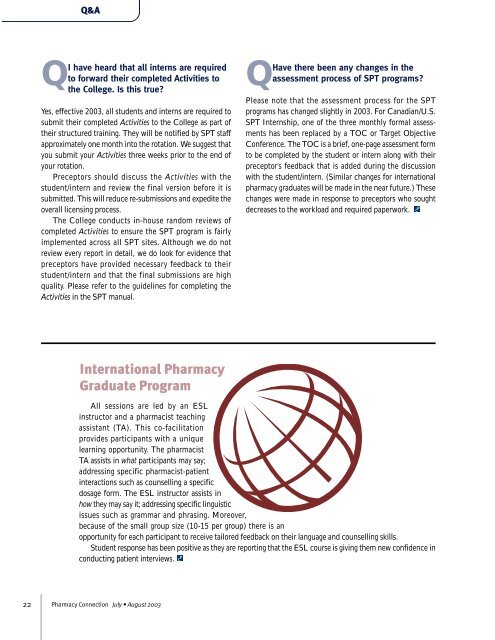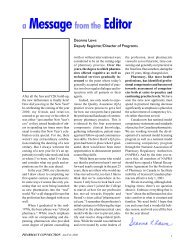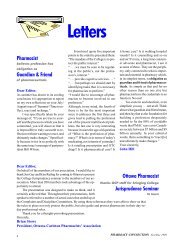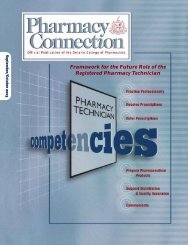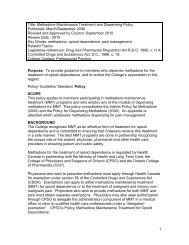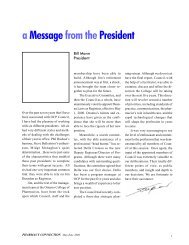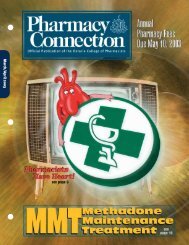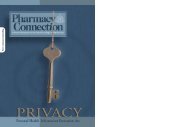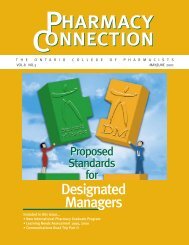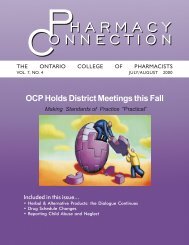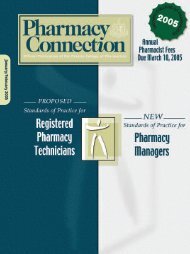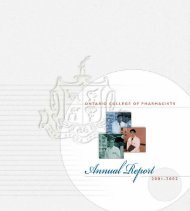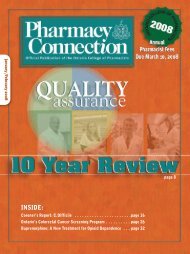July ⢠August 2003 - Ontario College of Pharmacists
July ⢠August 2003 - Ontario College of Pharmacists
July ⢠August 2003 - Ontario College of Pharmacists
Create successful ePaper yourself
Turn your PDF publications into a flip-book with our unique Google optimized e-Paper software.
Q&A<br />
QI have heard that all interns are required<br />
to forward their completed Activities to<br />
the <strong>College</strong>. Is this true?<br />
Yes, effective <strong>2003</strong>, all students and interns are required to<br />
submit their completed Activities to the <strong>College</strong> as part <strong>of</strong><br />
their structured training. They will be notified by SPT staff<br />
approximately one month into the rotation. We suggest that<br />
you submit your Activities three weeks prior to the end <strong>of</strong><br />
your rotation.<br />
Preceptors should discuss the Activities with the<br />
student/intern and review the final version before it is<br />
submitted. This will reduce re-submissions and expedite the<br />
overall licensing process.<br />
The <strong>College</strong> conducts in-house random reviews <strong>of</strong><br />
completed Activities to ensure the SPT program is fairly<br />
implemented across all SPT sites. Although we do not<br />
review every report in detail, we do look for evidence that<br />
preceptors have provided necessary feedback to their<br />
student/intern and that the final submissions are high<br />
quality. Please refer to the guidelines for completing the<br />
Activities in the SPT manual.<br />
QHave there been any changes in the<br />
assessment process <strong>of</strong> SPT programs?<br />
Please note that the assessment process for the SPT<br />
programs has changed slightly in <strong>2003</strong>. For Canadian/U.S.<br />
SPT Internship, one <strong>of</strong> the three monthly formal assessments<br />
has been replaced by a TOC or Target Objective<br />
Conference. The TOC is a brief, one-page assessment form<br />
to be completed by the student or intern along with their<br />
preceptor’s feedback that is added during the discussion<br />
with the student/intern. (Similar changes for international<br />
pharmacy graduates will be made in the near future.) These<br />
changes were made in response to preceptors who sought<br />
decreases to the workload and required paperwork.<br />
International Pharmacy<br />
Graduate Program<br />
All sessions are led by an ESL<br />
instructor and a pharmacist teaching<br />
assistant (TA). This co-facilitation<br />
provides participants with a unique<br />
learning opportunity. The pharmacist<br />
TA assists in what participants may say;<br />
addressing specific pharmacist-patient<br />
interactions such as counselling a specific<br />
dosage form. The ESL instructor assists in<br />
how they may say it; addressing specific linguistic<br />
issues such as grammar and phrasing. Moreover,<br />
because <strong>of</strong> the small group size (10-15 per group) there is an<br />
opportunity for each participant to receive tailored feedback on their language and counselling skills.<br />
Student response has been positive as they are reporting that the ESL course is giving them new confidence in<br />
conducting patient interviews.<br />
22<br />
Pharmacy Connection <strong>July</strong> • <strong>August</strong> <strong>2003</strong>


